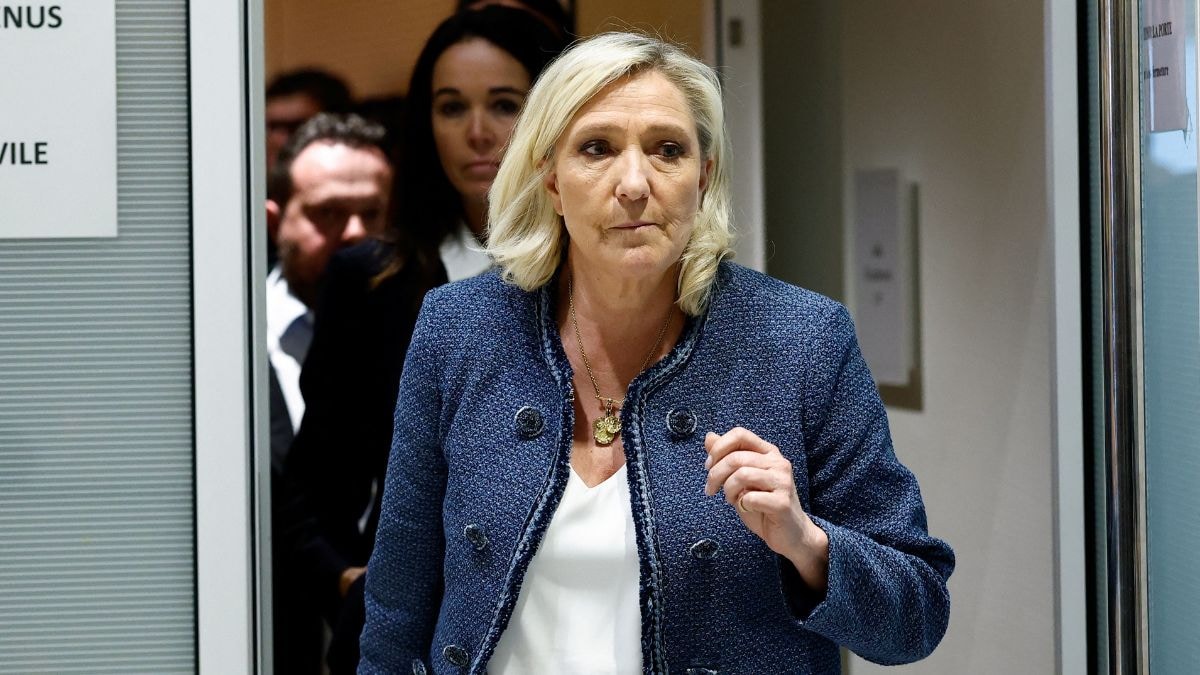Marine Le Pen, leader of France’s far-right National Rally (RN), has been convicted of embezzling European Parliament funds in a case that has dramatically altered the political landscape.
The court ruling bars Le Pen from running for public office for five years, effectively preventing her from contesting the 2027 presidential election.
The court also handed down a four-year prison sentence, of which two years are suspended, and the remainder to be served under electronic surveillance at home.
Additionally, she was fined €100,000 ($108,000).
This decision is a major setback for Le Pen, who has long been a dominant figure in French politics. Having run for president three times, she twice reached the final round against Emmanuel Macron and was widely seen as a front-runner for 2027.
Her party emerged as the largest single party in parliament following the 2024 snap elections, highlighting her influence in the country’s political sphere.
What is Le Pen’s embezzlement case?
The charges stem from an alleged long-term scheme involving Le Pen and 24 other party members, including European Parliament lawmakers and their assistants.
Prosecutors argued that the accused misused European Parliament funds allocated for parliamentary assistants, redirecting them instead to pay party staff in France.
The investigation covered contracts between 2004 and 2016, with judges determining that these funds, amounting to €4.5 million ($4.8 million), were systematically misappropriated.
Prosecutors maintained that these assistants were employed as party workers rather than fulfilling their intended European parliamentary roles. While the accused were not charged with personal enrichment, the court ruled that the funds were diverted to benefit the party rather than their designated legislative purpose.
During the trial, Le Pen denied any wrongdoing, asserting, “I have absolutely no sense of having committed the slightest irregularity, or the slightest illegal act.”
Her legal team argued that the prosecution had misinterpreted the role of parliamentary assistants and that the 2016 law enabling an automatic ban on public office should not be applied retroactively.
However, the
judges ruled in favour of an immediate ban, meaning she cannot participate in elections until her appeal process is concluded.
Who will replace Le Pen in 2027?
The ruling has sent shockwaves across the French political spectrum. Le Pen’s ban from public office means that, for the first time in nearly four decades, a presidential election could be held without a Le Pen on the ballot.
The RN now faces the challenge of selecting an alternative candidate for 2027, with
party president Jordan Bardella emerging as the likely choice.
Bardella, who at 29 is seen as Le Pen’s protégé, has gained popularity but lacks extensive experience in national governance. He expressed outrage over the court’s decision, stating, “Today it is not only Marine Le Pen who was unjustly condemned. It was French democracy that was killed.”
While he is viewed as the natural successor, questions remain over whether he can command the same level of support as Le Pen, who spent years mainstreaming the party.
Several political figures have voiced concerns over the implications of judicial intervention in electoral politics. Justice Minister Gérald Darmanin previously remarked, “Madame Le Pen must be fought at the ballot box, not elsewhere.”
His concerns are echoed by figures across the political spectrum, including Prime Minister François Bayrou and some left-wing opponents, who fear the decision could set a precedent for using legal mechanisms to sideline political adversaries.
What does this mean for Le Pen’s political future?
Despite the severity of the ruling, Le Pen’s political career may not be entirely over. She has vowed to appeal, and while the legal process could take months or even years, an overturned ruling would allow her to re-enter the 2027 race.
However, the timeline remains uncertain, and if the appeal is not resolved before the election, she will remain disqualified.
The RN’s strategy moving forward is crucial. With Macron’s departure due to term limits, France is entering a new political phase, with multiple candidates vying for leadership.
If Le Pen remains sidelined, Bardella will likely step in, but his ability to unify the party and appeal to a broad electorate remains in question. The RN’s expansion into mainstream politics has been largely driven by Le Pen’s leadership, and without her, the party faces an uncertain trajectory.
What does this mean for French-EU politics?
The verdict has not only affected French politics but has also drawn international attention. Some critics, particularly among right-wing movements in Europe and the United States, see the ruling as an effort to suppress nationalist political forces.
US Vice President JD Vance has been among those raising concerns over what he perceives as judicial overreach in European politics.
The broader debate over so-called “lawfare” — the use of judicial proceedings to target political opponents — has intensified, with some arguing that such measures undermine democratic principles.
Meanwhile, others contend that the ruling underscores the importance of accountability and upholding the rule of law, regardless of political affiliations.
In recent years, European politics has seen a surge in nationalist movements, with
right-wing parties gaining momentum in countries such as Italy and Hungary.
Le Pen’s conviction could have ripple effects, influencing how populist parties position themselves and how judicial systems respond to allegations of financial misconduct within political organisations.
With inputs from agencies
